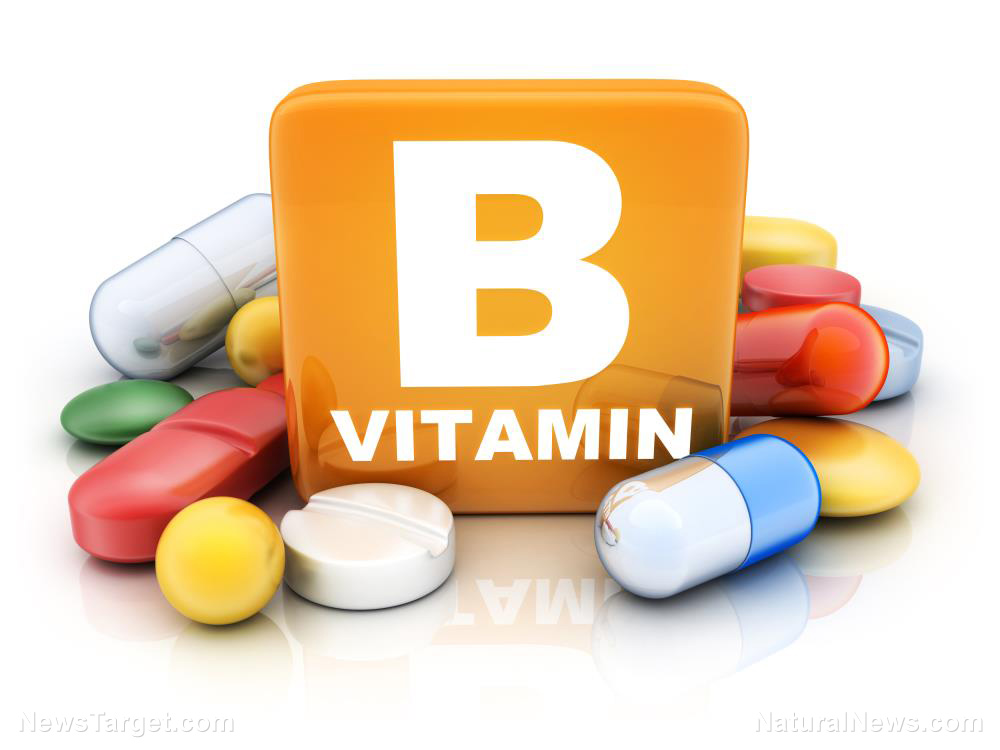Do you have a vitamin B deficiency? Symptoms to watch out for
01/30/2019 / By Ellaine Castillo

There are different types of vitamin B that the body needs to function properly. Having insufficient levels of any of these can significantly affect your body. However, it is important to note that deficiencies in specific types of vitamin B may not manifest in similar ways. To help you identify if you have are deficient in any form of vitamin B, here are the signs and symptoms that you should look out for, as well as some important information regarding these nutrients.
Vitamin B12
Among the different types of B vitamins, vitamin B12, also known as cobalamin due to its cobalt content, appears to be the most important. It is necessary for a wide range of functions including the production of red blood cells, neurological function, DNA synthesis, and maintaining heart health. To get adequate levels of vitamin B12, you must increase your intake of fish, meat, poultry, eggs, organ meats, or nutritional yeast. Another important thing to consider is that this vitamin is released from foods with the help of stomach acid and digestion. This means that a person who suffers from poor digestion may have insufficient levels of this vitamin even though they consume adequate levels of foods rich in vitamin B12. Some ways through which vitamin B12 deficiency can manifest include the following:
- Fatigue
- Weak muscles
- Constipation and poor appetite
- Numbness or tingling in hands and feet
- Poor memory or concentration
- Mouth sores
Vitamin B6
Vitamin B6 is an important nutrient for people who suffer from nausea and morning sickness, which is why it has become a common component of prescription nausea medications. This vitamin is also important for breaking down protein, carbohydrates, and lipids, as well as boosting the immune system. In addition to these, vitamin B6, also known as pyridoxine, has been implicated in maintaining the functions of the brain and the rest of the nervous system. It is necessary for the production of hormones and neurotransmitters, including serotonin, norepinephrine, and melatonin. Those who are deficient in this vitamin may exhibit signs like:
- Cracked corners of the mouth
- Swollen tongue
- Depression
- Confusion
- Weak immune system
- Irritability
Vitamin B1
Thiamine, or vitamin B1, is essential for cellular health and energy production since it is involved in the break down of glucose, amino acids, and lipids, as well as the growth and development of cells. It also plays a pivotal role in maintaining nerve, muscle, and heart function. Vitamin B1 can be acquired from various food sources. However, fruits appear to contain less thiamin compared to meat and seafood. Although it is not very common for people to suffer from vitamin B1 deficiency, those who do have it may exhibit the following signs and symptoms:
- Weight loss
- Confusion
- Cognitive problems
- Weak muscles
- Cardiovascular problems
Vitamin B2
Like vitamin B1, riboflavin or vitamin B2, also plays an important role in energy production and cellular health. It can function as an antioxidant and work alongside other B vitamins to break down fats, drugs, and steroids, convert amino acids into vitamins, and regulate inflammation. Foods that are rich in this nutrient include eggs, organ meats, mushrooms, beef, poultry, and green vegetables. If you do not have adequate levels of riboflavin, you may experience symptoms like:
- Low thyroid hormone levels
- Skin disorders
- Swelling of the mouth and throat
- Cracked lips
- Hair loss
- Infertility
- Red, itchy eyes or cataracts
- Liver problems
- Nervous system disorders
- Anemia
Vitamin B3
Niacin or vitamin B3 is important for the production of cellular energy and the maintenance of brain function. It is also important to get adequate vitamin B3, especially if you suffer from metabolic conditions like diabetes and obesity since it is involved in the regulation of cholesterol and triglyceride levels. Moreover, this nutrient is essential for maintaining healthy skin and relieving arthritis pain. Like other B vitamins, niacin can be acquired from poultry, beef, and seafood.
People who suffer from vitamin B3 deficiency may exhibit the following signs and symptoms:
- Cognitive problems
- Fatigue
- Depression
- Headaches
- Skin disorders
- Diarrhea
Vitamin B9
Folate or folic acid is a popular nutrient for pregnant women since it can reduce the risk of neural tube defects in developing babies. This nutrient is also important for the production of cells, especially blood cells, DNA, RNA, and amino acids. In contrast with other B vitamins, folate is more abundant in plant-based products like green leafy vegetables, fruits, and nuts. However, it can still be found in meat, seafood, poultry, and eggs. (Related: 10 Reason Why Our Diet Should be High in Vitamin B9 (Folic Acid) And Its Facts Sheet.)
Some symptoms that you may exhibit if you suffer from vitamin B9 deficiency include the following:
- Anemia
- Weakness
- Poor concentration
- Mood swings
- Headaches
- Mouth sores
- Changes in skin, hair, or nails
For more news articles on nutrition, visit Nutrients.news.
Sources include:
Tagged Under: cobalamin, folate, folic acid, niacin, nutrients, Pyridoxine, Riboflavin, signs, symptoms, thiamine, Vitamin B, vitamin B deficiency, vitamin b1, vitamin B12, vitamin B2, vitamin B3, vitamin B6, vitamin B9, vitamins


















